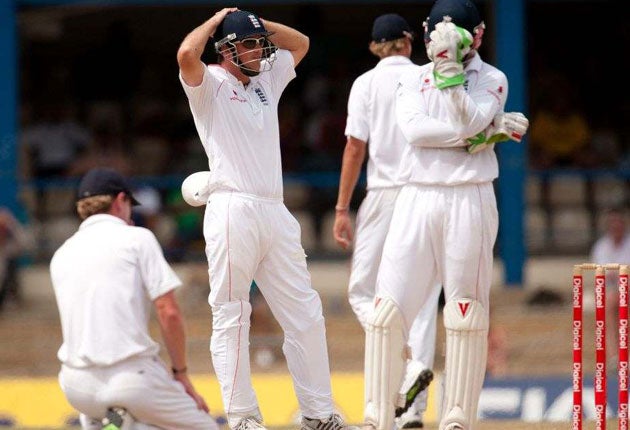Find out what makes England tick
The countdown to the Ashes has begun but Strauss must not panic.

For England, time is running out. There are 114 days before the Ashes begin and if they fancy a cold sweat, the website of the England and Wales Cricket Board has one of those fancy-dan digital clocks telling them exactly how many hours, minutes and seconds there are left until they must go into the middle and face Australia again.
This would always matter, but since the ECB's primary, formally stipu-lated, objective is to win the Ashes, the fate of several careers depends on the outcome. To look at the display is eerily fascinating, like watching the timing device on a bomb in a film where the hero has to work out what the hell to do before it reaches zero and the whole shebang goes up.
It is looking somewhat worse now than it was six weeks ago. Then England had run India close, if not close enough, but were at least on the cusp of putting West Indies in their place again. Australia were in disarray, having been beaten away by India and at home by South Africa. Yet by the middle of last week England had lost to West Indies, albeit narrowly, and Australia had avenged themselves by winning the first two return Tests against South Africa by huge margins.
A note of calm is needed, and in their calm ways, Andrew Strauss, the captain, and Andy Flower, the assistant coach, provided it. Losing a series England should have won is not an ideal reason for continuing the partnership, but England should do so.
Barring resignation or catastrophe, Strauss is certain to be in charge come 8 July. England do not need, cannot afford, a fourth captain within a year. But Flower is merely a stopgap after the deposal of Peter Moores as head coach. England hope to have a new man by April and are trawling the world to find him. Flower has applied. He knows he faces tough competition, that the captain is ultimately the leader in any cricket squad and tough decisions must be made. But in looking forward to the Ashes – he could not help it – Flower did not dwell on how little time there was left but how much.
"I think some interesting things have happened in this series," he said. "In terms of selection I think there is still some sorting out to be done. There is quite a long time between now and the Ashes, two Tests against West Indies at home and some first-class cricket for people to put their names forward." When you have to detach either the blue wire or the red one from the device to make everything safe, this is exactly the approach that is needed. Do not rush, do not panic.
Flower has impressed all the players on this trip, though some of those whom he played an instrumental part in rightly dropping may be less enamoured of him. Anybody taking over from Flower would barely know the players or what they can do. Flower has intimate knowledge and genuine insight. Both qualities will be needed.
Australia have suddenly found two formidable players in opening batsman Philip Hughes, a 20-year-old country boy from New South Wales, and the Queenslander Mitchell Johnson, 27, who has dramatically emerged as the best fast bowler in the world.
Not so England. Yet their position may be parlous but it is not hopeless. They have just made bundles of runs on benign Caribbean pitches, when six different batsmen made hundreds. Oddly, this may do the bowlers more good than the batsmen: they were endlessly frustrated and ultimately thwarted but have worked out new ways, new schemes, which should help on more accommodating surfaces.
By the end, Jimmy Anderson looked more the leader of a Test bowling attack than he has ever done. Reconciled almost completely with the bustling, head-down action he had when he burst on to the international scene, his swing, both conventional and reverse, and maturity make him a threat again. Stuart Broad, 22, was exhausted by the time England were denied a drawn series by two measly wickets last Tuesday but he is a model cricketer. He simply needs wickets.
The Nos 3 and 6 batting positions, and two of the bowling spots, are open to prolonged debate. Since the 2005 Ashes, No 3 has posed a problem and neither of its main occupants, Ian Bell and Michael Vaughan, has averaged 40, compared to Kumar Sangakkara's 68, Younis Khan's 63 and Ricky Ponting's 61. Bell, temporarily, and Owais Shah, perhaps permanently, have left open the glamour spot. It is not time for Vaughan again but for Ravi Bopara. There is enough experience elsewhere.
If Matthew Prior's wicketkeeping can improve – and it must – he can bat at six, although it is a slight risk, and Andrew Flintoff at seven. That would still leave England with five bowlers, none of whom is likely to be Stephen Harmison or Ryan Sidebottom unless there is dramatic improvement (drama is sometimes needed to alter the course of events). The off-spinner Graeme Swann has proved a wily cricketer.
England are at a low ebb. The world sees them as moneybags who never win a game of cricket. It will not be easy but Strauss and Flower, with the help of men who want to help them, can tackle that rapidly ticking clock.
Subscribe to Independent Premium to bookmark this article
Want to bookmark your favourite articles and stories to read or reference later? Start your Independent Premium subscription today.

Join our commenting forum
Join thought-provoking conversations, follow other Independent readers and see their replies